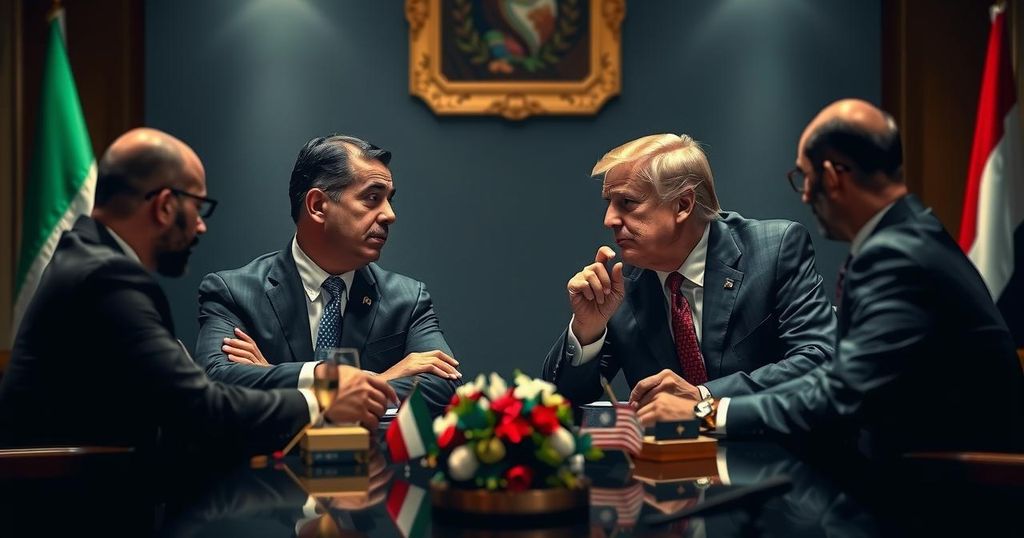Global news
ABBAS ARAQCHI, ALEPPO, ALEXANDER CORNWELL, ASIA, ASS, ASSAD, BEIRUT, BIN ZAYED, CONFLICT, DUBAI, EMIRATES, EMIRATI, EUROPE, GAZA, GAZA STRIP, GENEVA, HAMAS, HEZBOLLAH, IRAN, ISRAEL, ISRAEL-HAMAS CONFLICT, LEBANON, MIDDLE EAST, MIDDLE EAST AFFAIRS, NORTH AMERICA, PARISA HAFEZI, REUTERS, SANCTIONS, SHEIKH MOHAMED BIN ZAYED AL NAHYAN, SWITZERLAND, SYRIA, TEHRAN, U. S, UAE, UNITED ARAB EMIRATES, UNITED STATES, US, WHITE HOUSE
Jamal Walker
0 Comments
U.S.-UAE Talks on Lifting Assad Sanctions Amid Iran Relations Shift
The U.S. and UAE have engaged in talks about potentially lifting sanctions on Syrian President Bashar al-Assad if he distances himself from Iran and halts military aid to Hezbollah. These discussions are influenced by the expiration of U.S. sanctions and the increasing vulnerabilities of Assad’s regime. The initiative aims to exploit recent rebel advances, but the complicating factor remains Assad’s reliance on Iranian support. Financial incentives and reconstruction prospects are also possibilities on the table for exploiting this geopolitical opportunity.
The United States and the United Arab Emirates (UAE) are exploring the potential for lifting sanctions on Syrian President Bashar al-Assad, contingent upon his severance of ties with Iran and cessation of weapon transfers to Hezbollah in Lebanon. This dialogue has gained momentum in recent months, influenced by the impending expiration of extensive U.S. sanctions on Syria and Israel’s ongoing efforts against Iranian networks in the region. The recent advances by anti-Assad rebels signal vulnerabilities within Assad’s alliance with Tehran that the U.S. and UAE are keen to exploit. However, if Assad chooses to strengthen his partnership with Iran, the proposed diplomatic initiative could face significant complications.
Diplomatic interactions indicate that the UAE and U.S. are motivated by the possibility of enhancing business relations with Syria, as sanctions have hindered these initiatives. With the sanctions set to expire on December 20 unless renewed, discussions have focused on allowing the sanctions, particularly the Caesar Act, to lapse as a means to encourage Assad to pivot away from Iran. The urgency of these talks arises from a collective regional interest in reshaping Assad’s alliances in light of the geopolitical dynamics emerging from recent conflicts.
Moreover, regional powers have demonstrated readiness to offer financial incentives to facilitate Assad’s distancing from Iran, reflecting a broader strategy to isolate Tehran’s influence within the region. The precarious balance of power is further complicated by Hezbollah’s strategic withdrawal from Syria to concentrate forces in Lebanon, which has emboldened rebel movements. As tensions mount, the U.S.’s approach is framed as a dual strategy, employing both incentives and restrictions to reshuffle the alliances that have defined the Syrian civil conflict since its inception in 2011.
This evolving diplomatic landscape underscores the challenges faced by international stakeholders in navigating the complex interplay of interests surrounding Syria and its relations with Iran and other regional actors.
The ongoing Syrian civil war, which began in 2011, has profoundly influenced the geopolitical landscape of the Middle East, particularly concerning alliances and enmities among regional powers. The rise of Bashar al-Assad, bolstered by Iranian support, has drawn the ire of Sunni-led Arab states, resulting in widespread sanctions imposed by the United States and its allies. These sanctions were aimed at pressuring Assad to cease his violent repression of dissent and to limit Iran’s influence in Syria. Consequently, the interplay between U.S., UAE, and Assad—as well as the strong Iranian presence—has been a focal point for diplomatic negotiations in the region, especially in light of changes brought by recent conflicts and shifts in regional alignment.
In conclusion, the discussions between the United States and the UAE regarding the potential lifting of sanctions on President Assad signify a significant shift in regional diplomacy, driven by the dual dynamics of Assad’s relations with Iran and the broader security environment shaped by ongoing conflicts. While the U.S. and UAE aim to leverage recent developments to encourage a strategic split between Syria and Iran, the outcome remains contingent upon Assad’s choices amidst pressures from both Iranian support and regional adversities. The potential for sanctions relief and rebuilding efforts underscores the complexities and emerging opportunities in the region’s protracted geopolitical contestations.
Original Source: www.usnews.com




Post Comment